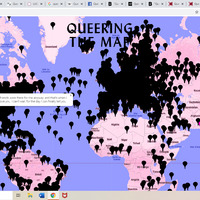-
Titre
-
Queering the Map
-
Créateur
-
Lucas LaRochelle
-
Date de création
-
2017
-
2018-02 (cyberattaque de partisans de Donald Trump qui force le site à être fermé)
-
2018-04 (deuxième publication)
-
Langue
-
Français
-
Anglais
-
La carte est internationale. Il y a donc une tonne de commentaires en une tonne de langues.
-
Résumé
-
Queering the Map est une carte du monde où les individus queer peuvent faire part de leur expérience. Tous les individus de la communauté LGBTQIA+ peuvent partager leurs moments queer : que ce soit de l'activisme, un baiser, une relation sexuelle, un amour passager, un rire, un moment de joie ou de tristesse, le site vise à faire part de l'expérience queer dans sa globalité. Les internautes peuvent lire les histoires ou ajouter les leurs au lieu où elles se sont passées.
-
Description
-
« Queering the Map is a community-generated mapping project that geo-locates queer moments, memories and histories in relation to physical space. As queer life becomes increasingly less centered around specific neighborhoods and the buildings within them, notions of ‘queer spaces’ become more abstract and less tied to concrete geographical locations. The intent of the Queering the Map project is to collectively document the spaces that hold queer memory, from park benches to parking garages, to mark moments of queerness wherever they occur.
There are no guidelines to what constitutes an act of queering space. If it counts to you, then it counts for Queering the Map. Anything from direct action activism to a conversation expressing preferred pronouns, from flirtatious glances to weekend long sex parties; all are part of the project of queering space. Queer history matters, and elders of the community are encouraged to add moments and places of historical significance to the map that enrich our collective memory.
Through mapping these ephemeral moments, Queering the Map aims to create a living archive of queer experience that reveals the ways in which we are intimately connected.
Territorial Acknowledgment
Queering the Map acknowledges that this project was started on the traditional territory of the Kanien’kehá:ka. The Kanien’kehá:ka are the keepers of the Eastern Door of the Haudenosaunee Confederacy. The island called “Montreal” is known as Tiotia:ke in the language of the Kanien’kehá:ka, and it has historically been a meeting place for other Indigenous nations, including the Algonquin peoples.
To find out on which Indigenous peoples' land you are located, please visit: www.native-land.ca. Beyond simply acknowledging the colonial histories of the land on which you are located, we encourage you to take concrete steps towards decolonization by learning more about the ways in which you can support local Indigenous groups. If you are located in Canada/Turtle Island, a good place to start is www.reconciliationcanada.ca.
Moderation
Posts to Queering the Map are moderated to ensure that no spam or hateful content is added to the site. If you see anything you feel should be removed, or would like something you posted to be deleted, please contact us! »
Mention de genre autodéclarée :« community-generated mapping project »
-
Notes sur les modalités procédurales
-
Participatif de contenu (Tout internaute peut ajouter son histoire)
-
Thèmes
-
Queer
-
LGBTQIA+
-
Sexualité
-
Coming out
-
Mémoire personnelle et collective
-
Acceptation
-
Plaisir
-
Tristesse
-
Instantanés de vie
-
Le quotidien et l'extraordinaire
-
Technique
-
Géolocalisation
-
Note sur la technique : Aucune information disponible. Selon la page Wikipédia, il y a un GitHub pour le site et il se qualifie pour le Project Galileo cybersecurity service de Cloudflare
-
Personne ayant créé la fiche
-
Aude Meunier-Rochon
 Queering the map.png
Queering the map.png
